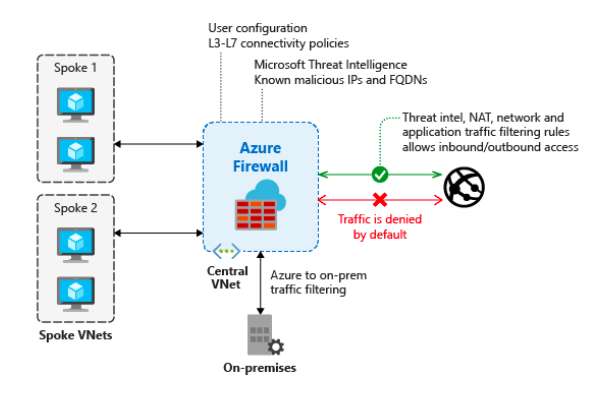- A service that uses a static public IP address to protect your VNet resources.
- Azure Firewall is PCI, SOC, ISO, ICSA Labs, and HITRUST compliant.

Features
- A stateful firewall service.
- You can enable forced tunneling to route Internet-bound traffic to an additional firewall or virtual network appliance.
- Limit outbound traffic to a given FQDN list, including wild cards.
- Filter any TCP/UDP protocol outbound traffic.
- To use FQDNs in your rules, you must enable DNS proxy.
- Deny the traffic of a malicious IP address with threat intelligence-based filtering.
- It has the highest priority rules and will always be processed first.
- Threat intelligence modes: Off, Alert only, Alert and deny
- With a DNS proxy, a firewall listens to port 53 and forwards the DNS requests to a DNS server.
- You can minimize the complexity of creating a security rule using a service tag.
- Associate up to 250 public IP addresses in your firewall.
- It supports SNAT and DNAT translation.
- SNAT – Source NAT for outbound VNet traffic.
- DNAT – Destination NAT for inbound network traffic.
- Azure Firewall diagnostic logs (JSON format):
- Application rule log
- Network rule log
- You can store all your logs in a storage account, event hubs, and Azure monitor logs.
- Azure Firewall metrics:
- Application/Network rules hit count
- Data processed
- Throughput
- Firewall health state
- SNAT port utilization
- To manage multiple firewalls, you can use Azure Firewall Manager.
- Protect your VDI deployments using Azure firewall DNAT rules and threat Intelligence filtering.
Pricing
- You are charged for each firewall deployment
- You are charged for any data processed by your firewall

No comments:
Post a Comment